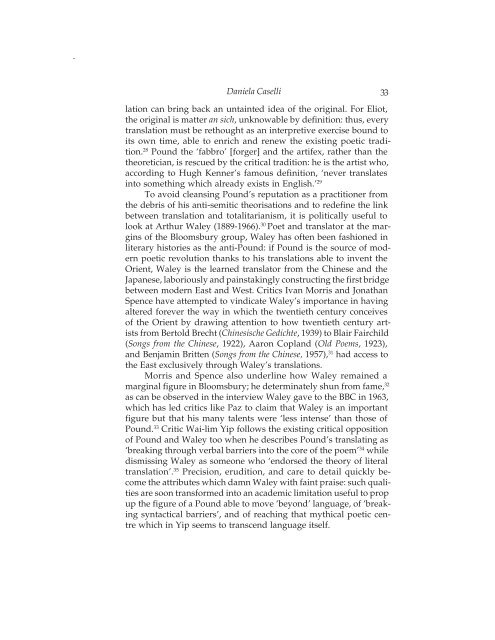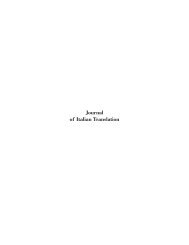Journal of Italian Translation
Journal of Italian Translation
Journal of Italian Translation
Create successful ePaper yourself
Turn your PDF publications into a flip-book with our unique Google optimized e-Paper software.
Daniela Caselli<br />
lation can bring back an untainted idea <strong>of</strong> the original. For Eliot,<br />
the original is matter an sich, unknowable by definition: thus, every<br />
translation must be rethought as an interpretive exercise bound to<br />
its own time, able to enrich and renew the existing poetic tradition.<br />
28 Pound the ‘fabbro’ [forger] and the artifex, rather than the<br />
theoretician, is rescued by the critical tradition: he is the artist who,<br />
according to Hugh Kenner’s famous definition, ‘never translates<br />
into something which already exists in English.’ 29<br />
To avoid cleansing Pound’s reputation as a practitioner from<br />
the debris <strong>of</strong> his anti-semitic theorisations and to redefine the link<br />
between translation and totalitarianism, it is politically useful to<br />
look at Arthur Waley (1889-1966). 30 Poet and translator at the margins<br />
<strong>of</strong> the Bloomsbury group, Waley has <strong>of</strong>ten been fashioned in<br />
literary histories as the anti-Pound: if Pound is the source <strong>of</strong> modern<br />
poetic revolution thanks to his translations able to invent the<br />
Orient, Waley is the learned translator from the Chinese and the<br />
Japanese, laboriously and painstakingly constructing the first bridge<br />
between modern East and West. Critics Ivan Morris and Jonathan<br />
Spence have attempted to vindicate Waley’s importance in having<br />
altered forever the way in which the twentieth century conceives<br />
<strong>of</strong> the Orient by drawing attention to how twentieth century artists<br />
from Bertold Brecht (Chinesische Gedichte, 1939) to Blair Fairchild<br />
(Songs from the Chinese, 1922), Aaron Copland (Old Poems, 1923),<br />
and Benjamin Britten (Songs from the Chinese, 1957), 31 had access to<br />
the East exclusively through Waley’s translations.<br />
Morris and Spence also underline how Waley remained a<br />
marginal figure in Bloomsbury; he determinately shun from fame, 32<br />
as can be observed in the interview Waley gave to the BBC in 1963,<br />
which has led critics like Paz to claim that Waley is an important<br />
figure but that his many talents were ‘less intense’ than those <strong>of</strong><br />
Pound. 33 Critic Wai-lim Yip follows the existing critical opposition<br />
<strong>of</strong> Pound and Waley too when he describes Pound’s translating as<br />
‘breaking through verbal barriers into the core <strong>of</strong> the poem’ 34 while<br />
dismissing Waley as someone who ‘endorsed the theory <strong>of</strong> literal<br />
translation’. 35 Precision, erudition, and care to detail quickly become<br />
the attributes which damn Waley with faint praise: such qualities<br />
are soon transformed into an academic limitation useful to prop<br />
up the figure <strong>of</strong> a Pound able to move ‘beyond’ language, <strong>of</strong> ‘breaking<br />
syntactical barriers’, and <strong>of</strong> reaching that mythical poetic centre<br />
which in Yip seems to transcend language itself.<br />
33

















